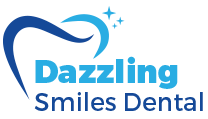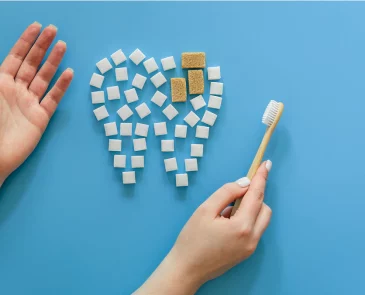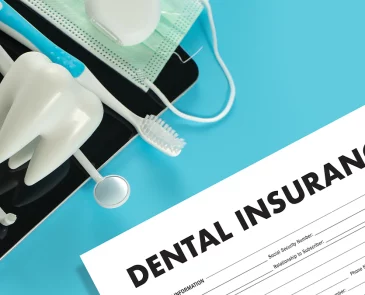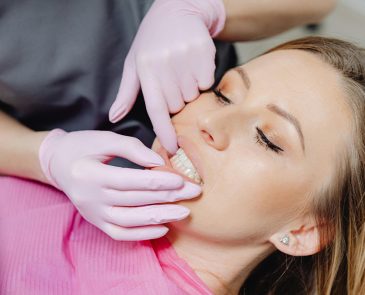Things you should know about Geriatric Dental Health: Senior Dental Care Tips for Elderly Teeth
Oral or dental health is no exception either. Maintaining senior dental care in later years is vital for preserving not only our smile but also our overall well-being. For seniors, taking care of their teeth and gums becomes even more critical to avoid issues such as tooth decay, gum disease, and tooth loss.
At Dazzling Smiles Dental, Craigieburn senior dentist, we believe that dental health for elderly should be focused on preventing problems, improving comfort, and ensuring an active, healthy lifestyle. If you’re looking for a compassionate and experienced Craigieburn senior dentist, here’s everything seniors need to know about taking care of their teeth and gums as they age.
Senior Dental Care: Key Tips for the Elderly
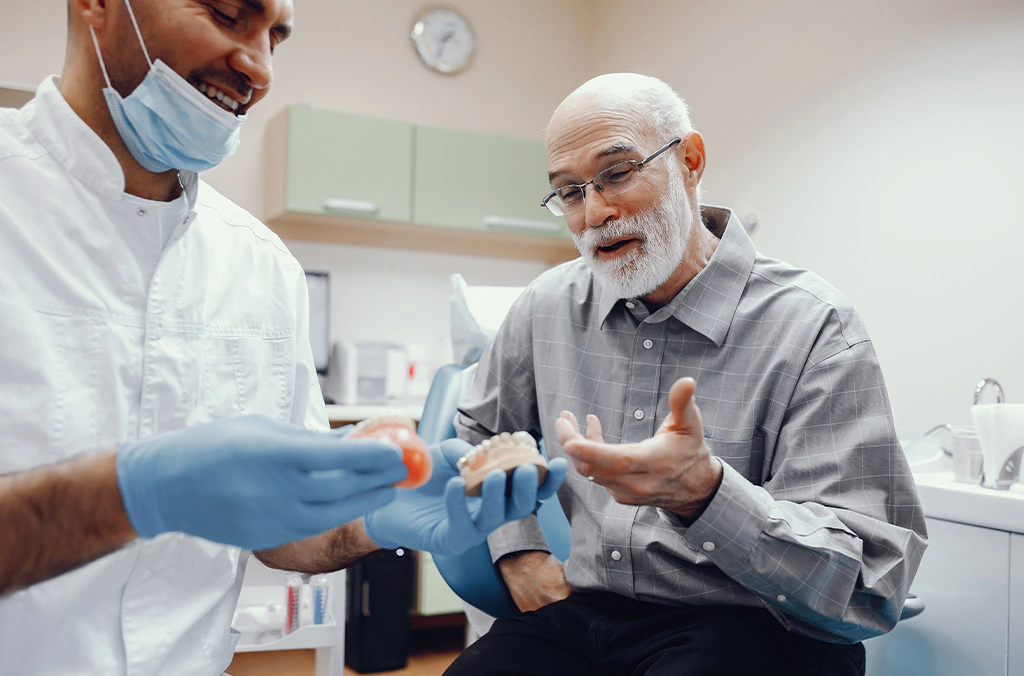
Good oral hygiene habits don’t change as we age-they simply become more important. For seniors, proper dental care can help prevent common issues like gum disease, tooth decay, and even tooth loss. Here’s a guide to maintaining healthy teeth and gums well into your golden years.
While our body changes with age, good oral hygiene habits should not–that’s assuming you were always practicing good dental hygiene. With age, practicing good oral hygiene becomes even more important as they help keep common senior dental issues such as gingivitis (gum disease), tooth decay and even tooth loss at bay.
Here are a few oral hygiene tips for seniors that can help maintain healthy teeth and gums even as you age.
Let’s start with the basics: Brushing and Flossing
Make sure you brush your teeth twice a day using a fluoride toothpaste. Also, do not use a brush with hard bristles. Using a soft-bristled brush is recommended because it works well to remove plaque from your teeth without damaging the enamel of the teeth. Brushing twice a day with a fluoride toothpaste helps prevent cavities.
If you wear dentures or partial dentures, make sure to clean them daily, using appropriate cleaning methods.
Flossing once a day is equally important to remove food particles and plaque from between your teeth. For those with limited dexterity, a floss holder or interdental brushes can be helpful in achieving this step more easily.
Regular Dental Checkups
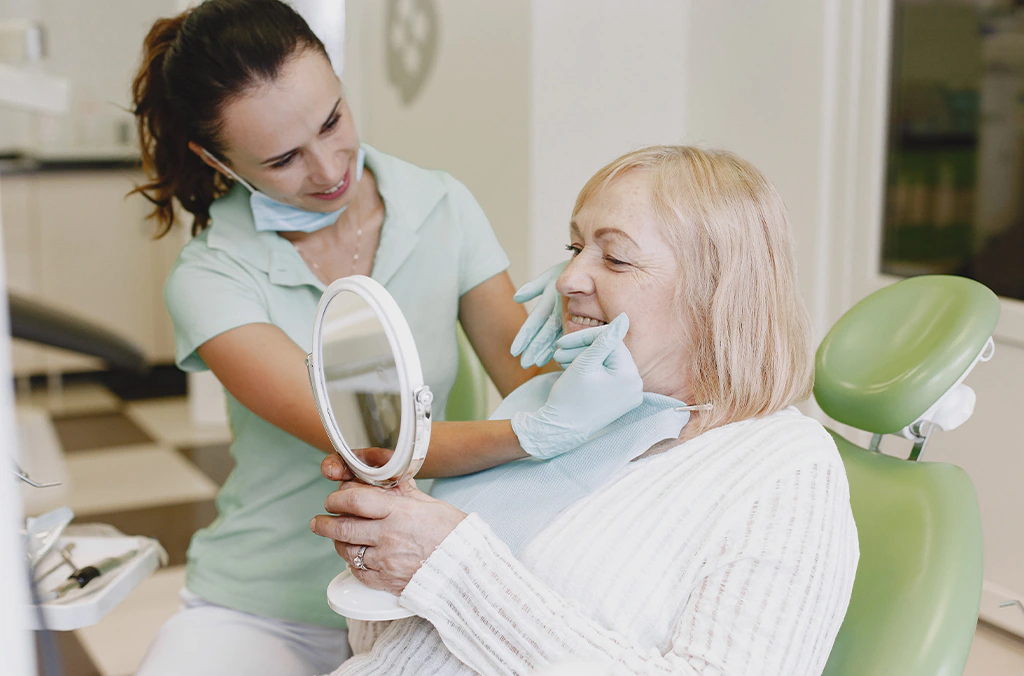
In general half-yearly dental check ups are recommended for everyone and seniors are no different. Even if you’re not experiencing pain, discomfort or any dental problems, it is a good idea to visit a trusted dental clinic every 6 months to catch any dental problem early. Visiting a dental clinic regularly means potential dental issues get detected early, preventing them from becoming more severe. Routine checkups help monitor the condition of your gums, teeth, and any dental appliances such as dentures or implants.
Dentures and Implants: Are they a good choice for seniors?
Now, let’s discuss dentures and implants for seniors who have lost their tooth/teeth.
Types of Dentures for Seniors
Dentures are a common solution for seniors who have lost some or all of their teeth. There are two types of dentures available–
- Complete denture set: This is a solution for seniors who have lost all their teeth.
- Partial dentures: Partial dentures are for seniors who still retain some natural teeth.
Here are a few concerns that seniors have when it comes to getting dentures-
- Will it be comfortable?
- Will the dentures look natural?
- Will I be able to chew and speak normally with my dentures on?
Advantages of Modern Dentures:
Modern dentures are very comfortable. They do not impact your ability to chew or speak. In fact, if anything, they make it easier for you to chew and speak, when compared to doing so without dentures. Also, now-a-days, the dentures that are available are very natural-looking and no one will be able to make out the difference between your natural teeth and dentures.
However, if you do wear dentures, it is important to care for them properly, otherwise it can lead to gum infections. You need to clean your dentures thoroughly, just as you would brush your teeth. You should soak them at night, as instructed by your dentist. Always handle your dentures carefully so as to avoid damage in the form of warping or breaking.
Let us now discuss benefits and challenges of Dental Implants for Seniors
For seniors who have lost their teeth or even a single tooth are looking for a solution that is more permanent than dentures, dental implants serve the purpose. Dental implants are an excellent choice if you do not want to go through the hassles that come with using dentures, such as soaking them every night. Dental implants are also sturdier than dentures and somewhat easier to manage. Dental implants are titanium posts inserted into the jawbone. They serve as a foundation for artificial teeth. Unlike dentures, implants are permanent and look and function just like natural teeth.
There are various advantages of using dental implants. Some of them are –
Stability: Dental implants act as a firm foundation on which your artificial/ replacement teeth will rest.
Comfort: Dental implants and artificial teeth are as close to natural teeth as you can get. Some denture users report mild discomfort when using dentures, which is not the case when you have a dental implant.
Natural look: The natural look of a dental implant gives you more confidence. As discussed before, dental implants are as close to natural teeth as you can get.
However, there is one challenge with dental implants, especially for elderly patients. For dental implants to be successful, you should have adequate bone density as it is your jaw bone that has to support your implant. Elderly patients often suffer from low bone density which makes it difficult to put dental implants in place. Sometimes, this challenge can be overcome with bone grafting.
Keeping your teeth in their prime even in your golden years: Preventive Dental Care for Seniors
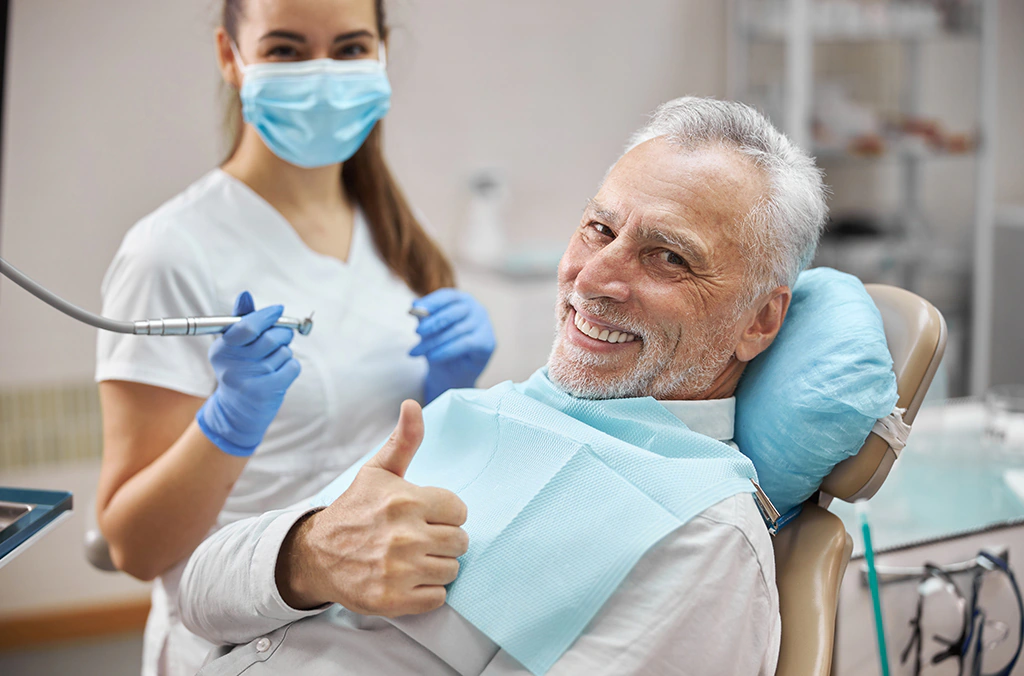
We all know that prevention is always better than cure. This is especially true when it comes to geriatric dental health. Here are some tips to help you prevent oral health problems as you age:
Eat a Balanced Diet:
A balanced diet has many health benefits in general, but did you know that having a healthy diet that is rich in fruits, vegetables, and dairy can help maintain healthy teeth and gums as well? And, of course, avoid sugary snacks and drinks, as they can lead to tooth decay and subsequently dental cavities.
Get Adequate Hydration:
Dry mouth, or xerostomia, is a common problem for seniors. Not drinking enough water can lead to oral health issues. Make sure you drink plenty of water (at least 2 to 3 liters) throughout the day. If you suffer from chronic dry mouth, despite drinking adequate water, chewing sugar-free gum may be a good idea. Chewing sugar-free gum stimulates saliva production, which in turn, helps prevent dry mouth.
Stop Smoking:
Smoking not only affects your lungs and puts you at an increased risk for heart attacks and strokes, but also increases the risk of gum disease and tooth loss. If you smoke, it is definitely time to quit in the interest of your oral health and overall well-being.
Gum Disease Prevention in Seniors
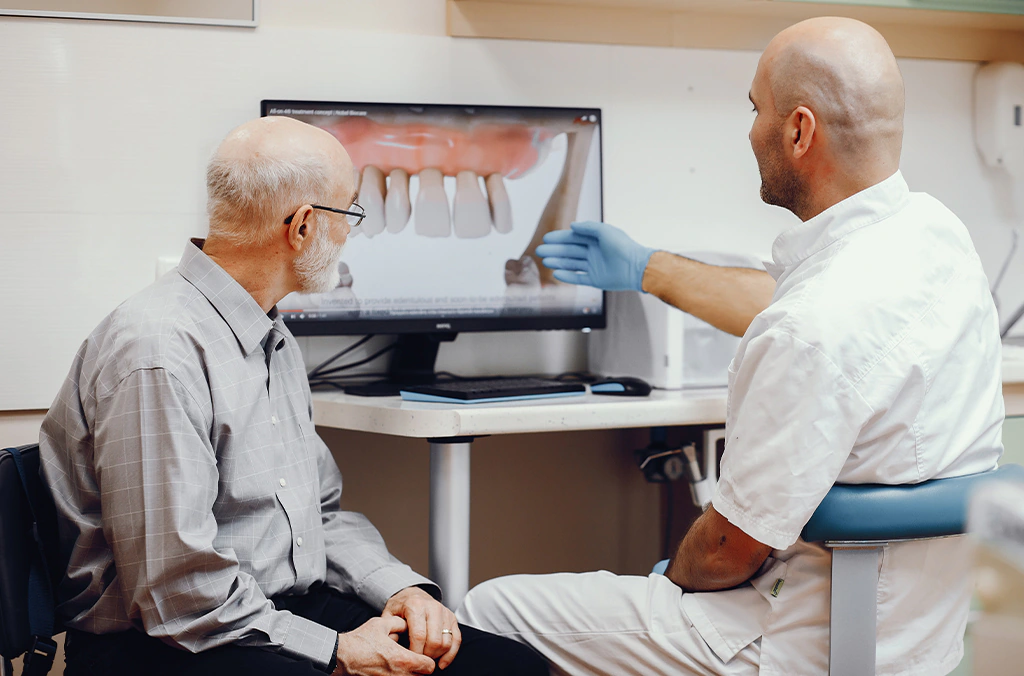
With age, you are at a higher risk for gum diseases. Hence, it is important that you take a few key steps to maintain your gum health. Gum diseases, if left untreated, can end up causing tooth loss.
What can you do to protect your gums? Well, here are a few tips to follow…
Daily Oral Hygiene Habits:
Brush for at least 2 minutes with a soft-bristled toothbrush. Do this at least twice a day. Make sure you use a toothpaste with fluoride content in it. Also, when brushing, make sure you brush not just your teeth but also along your gum line, but gently.
Do not skip flossing! Floss once a day, regularly, to prevent the buildup of plaque between the teeth.
Use antimicrobial mouthwash after meals to reduce bacteria in the mouth. But make sure your mouthwash is alcohol-free, as alcohol-based mouthwash can dry your mouth.
Early Signs of Gum Disease:
Watch out for signs of gum disease. If you notice red, swollen or bleeding gums, take an appointment to visit a trusted dental clinic near you at the earliest.
Managing Dry Mouth in the Elderly
Dry mouth is a common problem for older adults. Older adults are more likely to have medications and different health conditions that result in dry mouth. Dry mouth leads to difficulty in speaking, swallowing, and tasting food. Having a dry mouth also puts seniors at increased risk of tooth decay and gum disease.
Here are a few ways to manage dry mouth:
- Drink water regularly to stay hydrated.
- Use saliva substitutes or mouthwashes specifically designed for dry mouth.
- Chew sugar-free gum to stimulate saliva production.
- Avoid alcohol and caffeine, as they can worsen dry mouth.
FAQs

1. What are the most common dental problems in older adults?
Some of the common dental problems for seniors are-
- Gum disease
- Tooth decay
- Dry mouth
- Tooth sensitivity
- Tooth loss
These can be prevented with regular dental checkups, at least every 6 months. Half-yearly dental check ups can help catch these issues early and stop them from escalating further.
2. How does aging affect oral health?
Just like our physical health, aging has an effect on our dental or oral health as well. Aging puts us at increased risk for gum disease and tooth loss. This happens because the factors that cause gum diseases and tooth loss increase with age. These include dry mouth, receding gums and loss of immunity.
3. Are there affordable dental care options for seniors in Craigieburn?
At Dazzling Smiles Dental, Craigieburn, we offer a variety of affordable dental care options for seniors, including discounts and payment plans to help make dental treatments more accessible for seniors. We encourage seniors to inquire about insurance options and financing available during their consultation.
4. How can you keep your dentures in good shape and form and help them last longer?
To maintain your dentures:
Clean them daily with a soft brush and denture cleaner.
Soak them overnight in water or a denture solution to keep them moist.
Hot water can warp dentures, so do not use hot water to clean or soak your dentures. Also, remember, while it is okay to consume food or liquid that’s warm, avoid having them when they are very hot, so as not to damage your dentures.
5. How can seniors prevent gum disease and tooth loss?
In order to prevent gum disease and tooth loss, seniors–or anyone for that matter, should maintain a proper oral hygiene routine. This means you need to make simple habits a part of your lifestyle. Some of these habits are–
- Brushing twice a day, for at least 2 minutes each time
- Use a toothpaste with fluoride content in it
- Use only a soft-bristled brush so as not to irritate the teeth enamel
- Don’t forget to floss once a day
- Quit smoking
- Stay hydrated
- Make sure you visit your dentist every 6 months to catch any probable dental health issues.
Smile Healthy with Regular Dental Checkups
At Dazzling Smiles Dental, Craigieburn, we understand the unique dental needs of seniors. Regular checkups are crucial for maintaining oral health, preventing issues, and enhancing your quality of life. Our team is here to provide personalized dental care that suits your needs, whether you need dentures, implants, or just a routine checkup.
